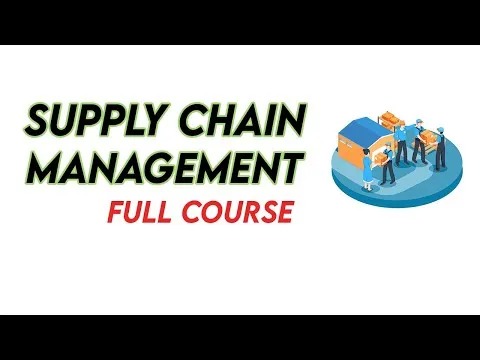
Intro to Managing Healthcare Supply Chain Operations 
Learn the basics of Intro to Managing Healthcare Supply Chain Operations ▼
ADVERTISEMENT
Course Feature
![]() Cost:
Cost:
Free
![]() Provider:
Provider:
Coursera
![]() Certificate:
Certificate:
Paid Certification
![]() Language:
Language:
English
![]() Start Date:
Start Date:
5th Jun, 2023
Course Overview
❗The content presented here is sourced directly from Coursera platform. For comprehensive course details, including enrollment information, simply click on the 'Go to class' link on our website.
Updated in [March 06th, 2023]
This course, Intro to Managing Healthcare Supply Chain Operations, is designed for individuals currently in the healthcare sector, as a provider, payer, or administrator, as well as those considering a career change to the healthcare sector. Participants will explore concepts and topics related to the design and management of operations and supply chains in the healthcare sector. The course will begin with an introduction to operations and supply chain management, followed by an examination of the different dimensions and principles of quality and approaches to operational process improvement. Participants will have the opportunity to apply the course concepts to an operational process improvement project.
[Applications]
Those who have completed this course can apply their knowledge to the healthcare sector by improving operational processes, developing strategies for quality improvement, and managing supply chain operations. Additionally, they can use their understanding of operations and supply chain management to identify and address potential issues in the healthcare sector.
[Career Paths]
1. Healthcare Supply Chain Manager: Healthcare supply chain managers are responsible for overseeing the supply chain operations of a healthcare organization. They are responsible for ensuring that the organization has the necessary supplies and materials to meet the needs of its patients. They must also ensure that the organization is compliant with all applicable regulations and laws. As healthcare organizations continue to expand and become more complex, the demand for healthcare supply chain managers is expected to increase.
2. Healthcare Operations Analyst: Healthcare operations analysts are responsible for analyzing the operations of a healthcare organization and making recommendations for improvement. They must be able to identify areas of inefficiency and develop strategies to improve operational processes. They must also be able to analyze data and develop reports to present to senior management. As healthcare organizations continue to become more data-driven, the demand for healthcare operations analysts is expected to increase.
3. Healthcare Quality Manager: Healthcare quality managers are responsible for ensuring that the quality of care provided by a healthcare organization meets the standards set by the organization. They must be able to identify areas of improvement and develop strategies to improve the quality of care. They must also be able to analyze data and develop reports to present to senior management. As healthcare organizations continue to focus on improving the quality of care, the demand for healthcare quality managers is expected to increase.
4. Healthcare Process Improvement Consultant: Healthcare process improvement consultants are responsible for helping healthcare organizations improve their operational processes. They must be able to identify areas of inefficiency and develop strategies to improve operational processes. They must also be able to analyze data and develop reports to present to senior management. As healthcare organizations continue to focus on improving their operational processes, the demand for healthcare process improvement consultants is expected to increase.
[Education Paths]
1. Bachelor of Science in Healthcare Administration: A Bachelor of Science in Healthcare Administration is a great way to gain a comprehensive understanding of the healthcare sector. This degree program will provide you with the knowledge and skills necessary to manage healthcare operations and supply chains. You will learn about the principles of healthcare management, healthcare finance, healthcare law, and healthcare information systems. Additionally, you will gain an understanding of the current trends and challenges in the healthcare sector.
2. Master of Science in Healthcare Administration: A Master of Science in Healthcare Administration is a great way to gain a deeper understanding of the healthcare sector. This degree program will provide you with the knowledge and skills necessary to manage healthcare operations and supply chains. You will learn about the principles of healthcare management, healthcare finance, healthcare law, and healthcare information systems. Additionally, you will gain an understanding of the current trends and challenges in the healthcare sector. You will also have the opportunity to specialize in a particular area of healthcare administration, such as healthcare policy, healthcare economics, or healthcare technology.
3. Doctor of Philosophy in Healthcare Administration: A Doctor of Philosophy in Healthcare Administration is a great way to gain an advanced understanding of the healthcare sector. This degree program will provide you with the knowledge and skills necessary to manage healthcare operations and supply chains. You will learn about the principles of healthcare management, healthcare finance, healthcare law, and healthcare information systems. Additionally, you will gain an understanding of the current trends and challenges in the healthcare sector. You will also have the opportunity to specialize in a particular area of healthcare administration, such as healthcare policy, healthcare economics, or healthcare technology.
4. Master of Business Administration in Healthcare Management: A Master of Business Administration in Healthcare Management is a great way to gain a comprehensive understanding of the business side of healthcare. This degree program will provide you with the knowledge and skills necessary to manage healthcare operations and supply chains. You will learn about the principles of healthcare management, healthcare finance, healthcare law, and healthcare information systems. Additionally, you will gain an understanding of the current trends and challenges in the healthcare sector. You will also have the opportunity to specialize in a particular area of healthcare management, such as healthcare policy, healthcare economics, or healthcare technology.
Pros & Cons

The course is described as very nice and helpful

Learners expressed appreciation and gratitude by saying thank you

No specific cons mentioned
Course Provider

Provider Coursera's Stats at AZClass
Discussion and Reviews
0.0 (Based on 0 reviews)
Explore Similar Online Courses

Physics - Energy and Momentum - High School and AP Physics

How To Embroider A Peony Flower

Python for Informatics: Exploring Information

Social Network Analysis

Introduction to Systematic Review and Meta-Analysis

The Analytics Edge

DCO042 - Python For Informatics

Causal Diagrams: Draw Your Assumptions Before Your Conclusions

Whole genome sequencing of bacterial genomes - tools and applications

MIT Free Supply Chain Management Courses

What Are Good Supply Chain Certifications?

Supply Chain Management (Full Course) SCM Lecture
 Related Categories
Related Categories
 Popular Providers
Popular Providers
Quiz
 Submitted Sucessfully
Submitted Sucessfully
1. What is the target audience of this course?
2. What is the main focus of this course?
3. What is the main outcome of this course?
4. Which of the following is a benefit of taking this course?


Start your review of Intro to Managing Healthcare Supply Chain Operations